
An imam who survived the terror attack at Al Noor mosque has declared New Zealand “unbreakable” in a sermon attended by thousands in Christchurch on Friday and called on world leaders eliminate hate speech, saying the massacre “did not come overnight”.
Speaking from a temporary stage set up in Hagley Park opposite the mosque, which is still surrounded by police tape a week after the attack, Imam Gamal Fouda said that in attempting to spread hate, the gunman who killed 50 people and injured 42 had instead sparked love and compassion.
“Last Friday I stood in this mosque and saw hatred and rage in the eyes of the terrorist,” he said. “Today from the same place I look out and I see the love and compassion in the eyes of thousands of New Zealanders and human beings from around the globe.”
The service followed a public call to prayer, which was broadcast on national radio and television and followed by a two-minute silence.
Survivors who were injured in the shooting sat in wheelchairs of the front row of the makeshift venue, while at the back, thousands of non-Muslim New Zealanders, including Prime Minister Jacinda Ardern gathered wearing hijabs to show their respects. Later, Ardern addressed the crowd, saying: “New Zealand mourns with you, we are one.”
Heavily armed police officers stood guard around the outdoor prayer service, while helicopters flew overhead. Under legislation announced by Ardern on Thursday, police will soon be one of the only groups able to access the kind of assault rifles they carry.
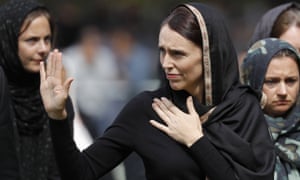
Fouda said: “This terrorist tried to tear our nation apart with an evil ideology that has torn the world apart but instead we have shown that New Zealand is unbreakable.”
He thanked “the neighbours who opened their doors to save us from the killer” and “those who pulled over their cars to help us”.
He thanked Ardern for “holding our families close and honouring us with a simple scarf”, saying her leadership had been “a lesson for the world”.
Ardern’s gesture of solidarity was echoed by women around around New Zealand, from police officers to council workers, journalists, and the wider public. Some posted images under the hashtags #headscarfforharmony and #ScarvesInSolidarity. The event was supported by the Islamic Women’s Council of New Zealand and the NZ Muslim Association.
Fouda also called on the governments of New Zealand and “nearby countries” to tackle hate speech.
“It was the result of the anti-Islamic and anti-Muslim rhetoric by some political leaders, some media agencies, and others,” he said. “Last week’s event is proof and evidence to the entire world that terrorism has no colour, has no race, and has no religion.”
Before the service began, Ardern, wearing the same black headscarf she wore when she met families, said that New Zealand mourned with the Islamic community.
“According to the prophet Muhammad … the believers in their mutual kindness, compassion and sympathy are just like one body,” she said. “When any part of the body suffers, the whole body feels pain. New Zealand mourns with you, we are one.”
Annelise Zwaan was among those who chose to wear a headscarf all day on Friday. “It is one way to share their experiences,” she explained.
Many of those killed in last Friday’s attack have been buried since police completed the formal identification of all bodies on Thursday. Among the 26 being buried on Friday at a single ceremony was three-year-old Mucad Ibrahim, whose sister Luul Ibrahim came from Perth, Australia, to pay her respects.
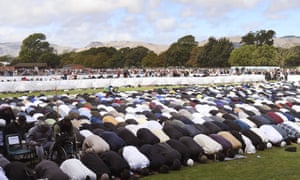
“My brother, I had never met,” she told The Guardian. “I wish I could have met him, but maybe one day I will meet him in heaven.”
Some people, like Taj Mohammad Kamran, were not able to attend the burial. Kamran was shot in the leg at Al Noor mosque and attended the service in his hospital robe and a wheelchair. He cried as he showed reporters photos of his cousin who was killed in the attack.
Others who were injured in the shooting had to rush back to hospital, their wounds still too fresh to go without constant care.
Mohammed Shahadad was not at the mosque last week. He is chronically ill, and was too sick to attend, but attended on a wheelchair on Friday.
“It was very difficult emotionally to come out today,” he said. “This is my local mosque … It was very moving to look out and see the support that the Muslims have got from the local community and the community all over New Zealand, it’s really pleasing and very emotional.”
The Guardian

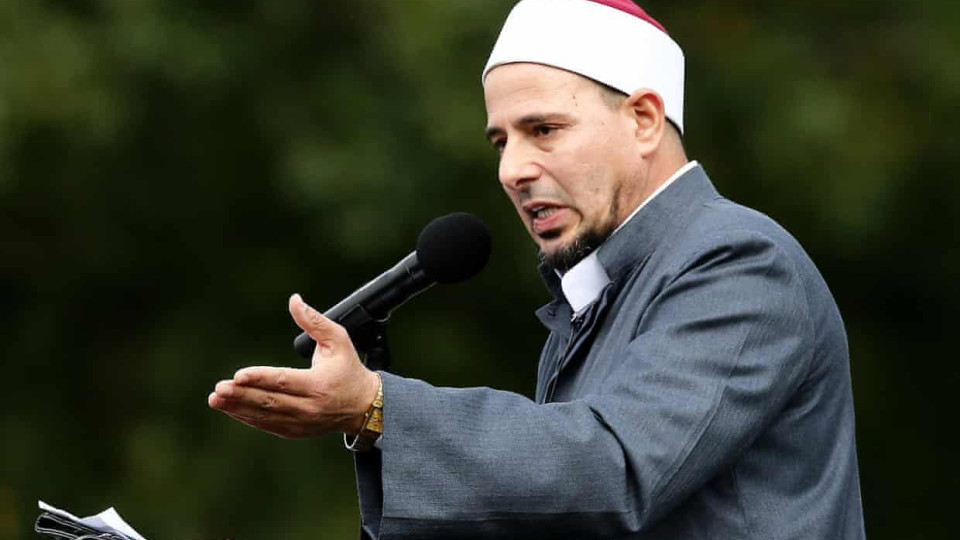




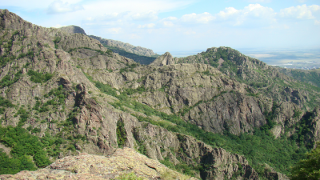
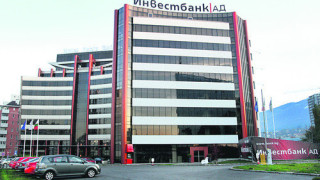
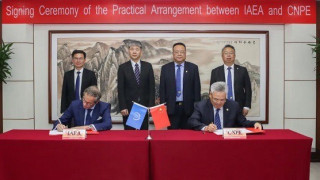

Leave a comment